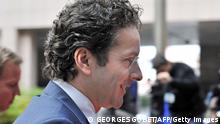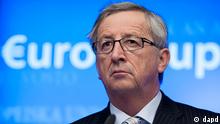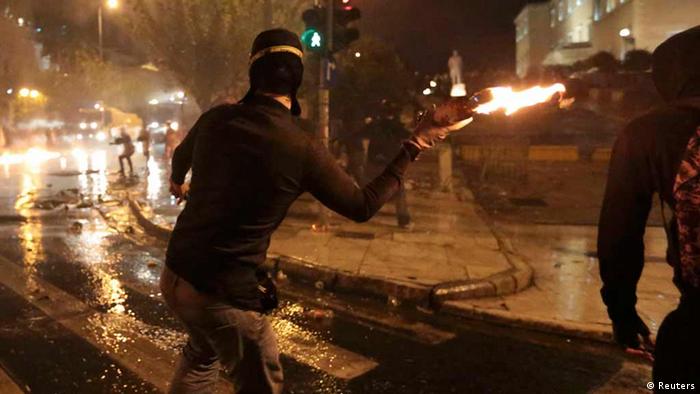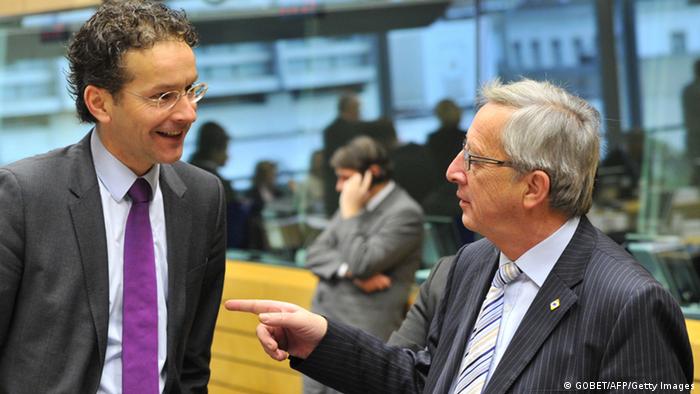Political heavyweight Jean-Claude Juncker steps down after eight years at the helm of the euro zone. He will be succeeded by Dutchman Jeroen Dijsselbloem. Juncker's humor is likely to be sorely missed.
For a long time, it looked like Germany's Finance Minister Wolfgang Schäuble was set to succeed Jean-Claude Juncker as head of the Eurogroup, the informal gathering of the EU member states who share the euro.
But when Socialist Francois Hollande took office as France's new president after the elections in spring of last year, Schäuble's name was dropped: Paris no longer supported the man who is both famous and infamous in Brussels for his insistence that austerity is the sole cure for the eurozone's economic woes.
The French elections were followed by months of standstill. On one occasion, this even prompted Schäuble to attempt to turn it into a joke with journalists. Personnel discussions were great food for journalists at least, he said, because they dragged on for so long: "At last, you and your colleagues have something to write about."
Dijsselbloem represents austerity
 Jeroen Dijsselbloem is a supporter of budgetary discipline
Jeroen Dijsselbloem is a supporter of budgetary discipline
The time of uncertainty is now over. But who is Dijsselbloem?
Experience is not exactly something that the Dutchman has an abundance of, given that he was only born in 1966.
His slicked-back curls give Dijsselbloem a boyish look. The muted colors of his suits contrast with his laid-back appearance. He is a former assistant for the European Parliament's group of his party, the Labor Party. He spent some time at the University of Cork in Ireland for research purposes. And he was only appointed Dutch finance minister in the autumn of last year.
His European colleagues have had little opportunity to get to know him. But Dijsselbloem, it seems, is already committed to an agenda of strict budgetary consolidation. At his first appearance in Brussels as a minister back in November, he commented on the EU budget negotiations by saying: "In the Netherlands we have to make drastic cuts, and not just in the Netherlands, also in almost every other European country. That's why it would be inconceivable to assume that it can't happen in Brussels."
Irony in four languages
The shoes that Dijsselbloem has to fill are huge. The outgoing president of the Eurogroup, Luxemburg's Prime Minister Jean-Claude Juncker, is somewhat of a European legend. He's famous for his comments, that often leave his audience wondering whether he's being ironic or not. A recent example: "Whenever the Germans think nobody's listening, they make inappropriate comments about the size of my country."
 Juncker was an EU heavyweight and his shoes will be hard to fill
Juncker was an EU heavyweight and his shoes will be hard to fill
His remarks - in German, French, English or in Luxembourgish - have often been moments of relief for weary journalists during many a long night of negotiations in Brussels.
At a press conference last year, Juncker responded to problems with the sound system: "I have ceased to exist, I have never existed, I shall rise again. Here I am!" It's witty remarks like this that many in Brussels will sorely miss in the future.
Multiple tightrope walks
Overall, of course, the last few years have hardly been a laughing matter. They were dominated by the euro crisis - and that's not likely to change in the near future. Consequently, Juncker was faced with the challenge of performing multiple tightrope walks: He had to put pressure on weaker countries to introduce painful cuts and reforms. "Game over!" was Juncker's reaction to Greece's creative budgetary accounting.
But Juncker was also well aware of the strains the population was under. And when calls got louder demanding a Greek exit from the eurozone, Juncker's reaction was prompt and harsh: "I don't envisage - not for one second - Greece leaving the euro area. This is nonsense."
But he also had to push the more stable countries to show some solidarity, time and time again - without putting them off too much by confronting them with exaggerated demands.
The controversial question of debt mutualization across the eurozone was one where Juncker's skill of political maneuvering became clearly visible. When asked about how much risk German tax payers were facing he delivered one of his typical replies: "You risk the most if you don't risk anything."
But Juncker also made wrong assessments. In November 2010, he was sure that "in the case of Greece, of Portugal and Ireland, in no way will there be - for the period until mid-2013 - a private sector involvement." - Only to admit a few months later that there would in fact be private sector involvement.
As president of the Eurogroup, he had to make sure that the gap between the 17 countries in the currency union and the remaining ten in the European Union didn't widen too much.
 Juncker led the euro zone through difficult times
Juncker led the euro zone through difficult times
Listen and engage with others
There's widespread agreement that Juncker has mastered all the different challenges well. There was little criticism and when it did arise, it was usually targeted at questions of content.
In most cases, Juncker would demonstrate his will to find a compromise. At a committee session a few weeks ago, Hans-Peter Martin, an independent member of the European Parliament, exclaimed with enthusiasm that Juncker should become the next Commission President. Juncker's reply was a brief "yes" – followed by a quiet grin, that didn't reveal whether or not he was being serious.
During the same session, Juncker initially said he neither wanted to take stock of his presidency nor give his successor any advice. He then went on to say that Europe was "complicated." And that most people didn't engage enough with other points of view. There was one lesson he'd learned, he said: "Knowing about other people's difficulties is essential to get European projects underway. So here's some advice for my successor: You have to love the others if you want to get by yourself."
When asked about his own future a couple of days ago, the 58-year-old said that after decades of involvement in politics, power had "lost any erotic dimension" for him.
He added that, as Luxembourg's prime minister, who was no longer at the helm of the euro group, he would now be able to comment on European politics much more freely than before: "You will hear from me again," he said. dw de

Comments